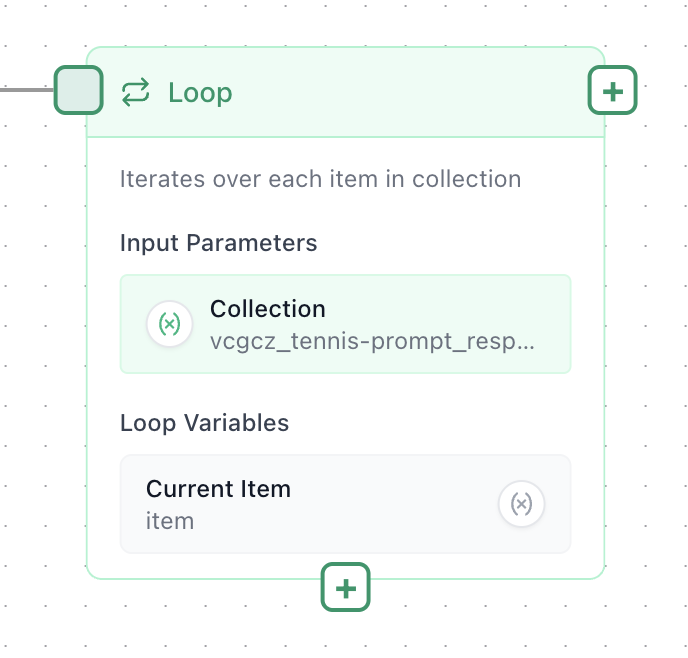Workflow Nodes
Prompt Node
The prompt node gives you access to any prompt that has been made available to you - either prompts you've created yourself or ones shared within your organization. This is one of Aisle's most powerful features, allowing you to build prompts as reusable "Lego blocks" that can be shared across multiple workflows.
When you add a prompt node, you'll select from your available prompts and connect it into your workflow, making complex AI operations modular and maintainable.
Condition Node
Condition nodes create branches in your workflow with true/false paths based on whether your specified condition is met. You set conditions by evaluating a variable against either a static value or a reference to another variable.
| String Operations | Number Operations | Array Operations |
|---|---|---|
| Equals | Equals | Includes value |
| Does not equal | Does not equal | Does not include value |
| Contains | Greater than | |
| Does not contain | Less than | |
| Is null | ||
| Is not null |
Loop Node
Loop nodes allow you to repeat operations either iterating through a collection (array) or by a predetermined number of times. The loop node features a special bottom connector where you attach the nodes that should run inside the loop.
Configuration Options
Run Count
Execute the loop a specific number of times
Iterate Collection
Process each item in an array (from memory queries, prompts, scripts, or inputs)
Item Variable
When iterating a collection, this names each individual item as it's processed
Output Modes (for collections)
Map
Returns an array of the last value from each iteration
Flat Map
Flattens nested arrays from iterations
Reduce
Combines iteration results into a single value
Variables set within loops will override any previously defined variables with the same name.

Memory Node
Read more here on the Memories Page
Variable Node
Variable nodes manipulate variables within your workflow, providing essential data transformation capabilities.
Available Actions
| Action | Description |
|---|---|
| Set/Update variable | Create new variables or update existing ones with static values or references |
| Pluck value | Extract specific keys from JSON objects (supports deep fetching with dot notation, e.g., "player.name") |
| Add to array | Append items to existing arrays |
| Set object key value | Update or create keys in JSON objects |
| Parse JSON | Convert stringified JSON to native JSON objects |
| Stringify JSON | Convert JSON objects to strings |
| Split string | Break strings into arrays based on delimiters (useful for CSV data) |
| Join array | Combine multiple arrays into one |
| Concatenate strings | Merge multiple strings together |
Chat Action Node
Chat action nodes enhance responses when workflows are triggered from within a chat interface. These nodes are safe to include in any workflow - they simply won't execute if the workflow isn't being run from a chat context. These enhancements help provide context and additional resources without cluttering the main chat response.
Available Chat Enhancements
Links
Add clickable tabs with custom names and URLs at the bottom of messages, perfect for references to external or internal systems
Modals
Create tabs that open detailed information windows with titles and body content when clicked, ideal for expansive references
Accordions
Design collapsible sections for organizing additional information

Script Node
Script nodes allow you to run custom code within your workflow. These scripts are managed in the Tools and Scripts section and provide a way to execute arbitrary code that receives defined variables and returns an output.
When to Use Script Nodes
Data Transformations
Run basic data transformations
HTTP Requests
Make HTTP requests
Data Formatting
Format data in specific ways
Custom Logic
Execute any custom logic where you know exactly what code you need
This node type lets you write the code you need while keeping the UI out of your way.